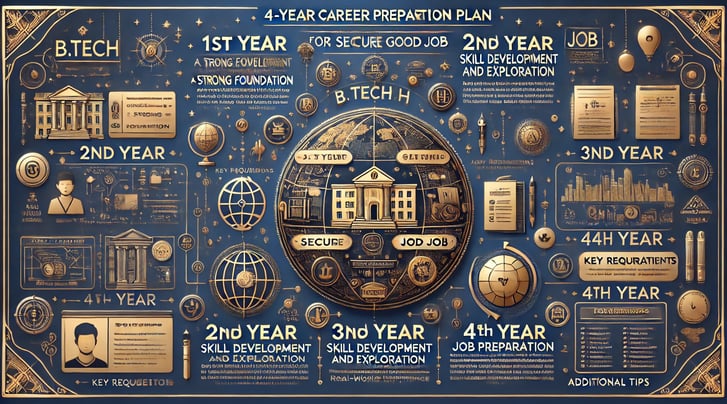ALL ARE AT ONE PLACE :: REACH YOUR GOAL FROM THIS SPACE - exclusive deals, insightful articles & affordable images
How to Get a Good Job in Your Final Year of B.Tech: A Step-by-Step Guide
If you really want to seek a good job in your final year of B.Tech, the sooner is now you decide and start planning and preparing. Below, I've outlined a comprehensive plan of action for each year of your B.Tech and the key requirements to make yourself industry-ready By the time you graduate, with the following strategic approach, you will have worked both on the technical side and on the soft skills required for a good job. Disciplined and proactive throughout and you’ll have set yourself up to succeed.
acharyadevobhava.com
11/7/20245 min read


In case, you actually want to find a good job in your final year of B.Tech, the sooner is now you decide and start planning and get ready. Below, I've outlined a comprehensive plan of action for each year of your B.Tech and the key requirements to make yourself industry-ready:
1st Year: Build a Strong Foundation
- Focus on Academics: Start your journey in building a sturdy base for your foundation in Mathematics, Programming (C/C++) and some engineering disciplines.
- Explore and Learn: Use the coming year to branch out into new equipment of engineering (e.g. software development, AI, ROBOTICS, electronics), in order to find out what you like.
- Start Coding: You can study basis of programming like C or Python. Coding to become logical and solve problems is the best time to start practicing, so this is the best time to start practicing coding.
- Soft Skills: Develop into a person with soft skills such as communication, teamwork and public speaking. Get involved with their interpersonal skills, join clubs, start participating with university activities.
- Participate in Workshops: Attend seminars and workshops on different technologies, engineering fields.
2nd Year: Exploration & Development of Skills
- Deepen Programming Knowledge: It’s also good time to learn some additional programming languages, like Java or Python. Practice Data Structures and Algorithms (DSA) on LeetCode, HackerRank, CodeChef and more.
- Take Online Courses: To gain some extra edge up, take quality courses on the hottest technologies among them using platforms such as Coursera, Udemy or edX on a variety of topics, (e.g., web development, data science, AI/ML, cloud computing, etc.)
- Explore Fields of Interest: If you have a domain that you wish to concentrate on e.g. AI, Machine Learning, IoT, Cybersecurity, etc. then dive into that a bit more.
- Build Projects: Start by building small projects in the field in which you wish to enter. It will be very helpful when applying that which you have learned in practice on your resume.
- Networking: Use it to connect with your peers, seniors and professors and start building your professional network. Post a brief description of yourself on LinkedIn and begin to connect with people in your industry you want to work for.
3rd Year: Experience in Real World & industry preparation
- Internships: You should also really try hard to have an internship over the summer after your third year. How you develop your resume can really jump out with helping you with exposure to industry culture and practical experience.
- Advanced Courses: Once you’ve mastered the old basics, move on to learn what’s actually useful for your specific field here. For example if you’re looking at AI perhaps you’d like to begin with machine learning algorithms, or perhaps you might want to dive into web development with React.
- Projects & Competitions: Build bigger projects, individually or as part of a team. That is why you should join hackathons, coding competitions and project expos. Smart India Hackathon (SIH) competitions are a chance to highlight your work to others and also be highlighted yourself.
- Develop Problem-solving Skills: In case you are seeking software jobs, then practice DSA problems and enhance your programming skills for competitive programming.
- Certifications: After which, you get your certifications. If you choose to become qualified on something, then AWS, Google, or Microsoft is worth it.
4th Year: Job Preparation & Application
- Placement Training: As there are many colleges which have placement training. These resources will help you prepare for aptitude tests, group discussions and personal interviews.
- Resume Building: We’ve downloaded our template of an impressive resume which highlights your skills, projects, internships, certificates and achievements. If I could stick to what I would only need to do, and focus on what I would be doing in each job, I probably would not have gotten into another job as quickly as I did.
- Apply for Jobs: There are plenty of campus placements as well as jobs on job portals like LinkedIn, naukri.com, nextbigwhat.com, internshala.com, angelist.com.
- Work on Aptitude and Soft Skills: Sometimes a company’s hiring process can include an aptitude test. Reasoning and what not, to practice quantitative aptitude. So even as much as your hard skills are, don’t underestimate your soft ones, especially in terms of confidence, communication and public speaking.
- Interview Preparation: Review what you can objectively measure your strengths and weaknesses from key insight areas that you revisit. Common interview questions practice, mock interview and have your elevator pitch ready when you introduce yourself.
- GitHub and Portfolio: You can create a personal GitHub profile and if you are not off having fun in the sun you can let others see your projects. If that’s your thing, make yourself a portfolio website detailing your work for people to check out.
How to Get a Good Job
1. Technical Skills: Top of your list will be technical skills. This includes:
The list of languages used in building applications includes Python, Java, C++.
Among the languages other than Java like python, Java and C++.
This is about Data Structures and Algorithms.
depending on the field you work in, relevant tools, frameworks or software.
- Technologies I work with are Clouds, Machine Learning, Web Development etc.
2. Projects: The important part is practical experience on projects. In this, you show you teach what you learn.
3. Internships: But if you can when you get relevant internships that’s great it gives you sector relevant experience that’s a step ahead.
4.Problem-Solving and Competitive Coding: If you are trying to make it into a software developer, go on LeetCode, Codeforces or Hackerrank for practicing your skills of coding.
5. Communication Skills: You need good communication skills in technical and non technical roles. Making your makes and solutions clear is absolutely vital.
6.Networking: So if you’re going to be part of a big network in your industry just to get referrals or job opportunity, there’s nothing wrong with that.
7. Certifications: If you have some certifications connected to the domain like 'Data Science', 'Cloud Computing' or whatever other skill, you have a reason to give your profile credibility.
Additional Tips
- Participate in Extracurricular Activities: Showing yourself to be well rounded? Take part in student clubs, be a leader, work in some form of volunteer organization.
- LinkedIn Presence: Updating yourself with your skills, certifications, projects, and experiences also works on your LinkedIn profile. With relevant content and be moving and stay visible.
- Practice Interviews: Practice on platforms such as Pramp or InterviewBuddy to have a little idea how a real interview is going to go.
- Stay Updated: At least ensure you know what is happening in the world at least, and in the piece of technology you find kind of promising. Books in your field, read blogs and attend webinars.
Summary Plan of Action:
1. First Year: Focus on one, learn the other: one is academics, the other is programming, and the other one -the interests.
2. Second Year: Work on small project, take online courses, develop technical skills.
3.Third Year: Larger projects, competing, certifications and internships.
4. Fourth Year: And everything in between, from placement prep to resume building to applying for jobs.
After you graduate you will have done the technical work and the soft work necessary for a good job with this strategic approach. P roactive throughout and disciplined and you are well placed for success.


